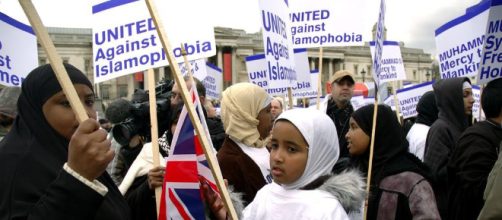THE ANTI-SEMITISM mess that has engulfed the press the last few weeks has allowed Islamophobia to go even further under the radar. The fact that Islam is intrinsically linked to Palestine, who are being oppressed by Israel and the UK government see any form of support towards the Muslim community as a fuel for anti-Israel sentiment, they are reluctant to do anything about the issue that has increased dramatically since 2016.
The media are failing in getting the information into the public domain and the government is actively undermining activism that favors Palestine, further to that, they are purposefully suppressing any conversation about Israel.
An increase in Islamophobia
It was in 1997 that the landmark report by race equality think tank Runnymede Trust introduced the word “Islamophobia” into public discourse.
Years later, Islamophobia has become prevalent enough that one politician claimed it has “passed the dinner table test”. Yet since the Brexit vote, there has been an increase of violent crimes against the community, furthermore, it has been exacerbated by government policy and in 2017, 10 years after the original report a follow up was released, which features contributions from 23 academics and maps Islamophobia across society.
It also contains harrowing individual stories that range from school playground bullying to unrestrained verbal abuse to workplace discrimination. In 2017 another study by a government watchdog found that Muslim men and women are being held back in the workplace by widespread Islamophobia, racism and discrimination.
It also finds that Muslim adults are far less likely to be in full-time work. Research for the government’s social mobility watchdog found a strong work ethic and high resilience among Muslims that resulted in impressive results in education.
More recently Sajid Javid claimed that most people who don’t speak English in the UK are Pakistani and Bangladeshi, a claim that is easily refutable from the governments own statistics that can be found easily online. Ethnicity facts and figures show it to be one in six. If the government are serious about integration and want to do something about this ‘claim’ that language is a barrier for them, then why have the cuts to the ESOL language course amounted to £120 million since 2009.
As Siema Iqbal said in an article in the Middle Eastern Eye, “English language proficiency is not the main issue in someone feeling less integrated and it needs to stop being framed as being about cultural differences. What makes my patients feel less integrated is inequality”.
Myths believed by the public
The British population largely are misinformed over the Muslim population, the Muslim Council of Britain (MCB) cite a YouGov poll that says, British people tend to think that Muslims make up 17% of the population, when the figure is actually 5%, 37% have admitted that they would more likely support policies that would reduce the number of Muslims in the country. Around 6% agreed that Britain would ‘lose’ its identity if more came over, this compares to 48% in 2003.
Staggeringly, 80% of comments from readers on a range of newspapers are either highly critical of Islam or express hateful views (figures from Muslim Council of Britain).
Another 55% have admitted they wouldn’t like a mosque to be built within their community and around a quarter blame Muslims themselves for the existence of Islamophobia. The likes of Nigel Farage have done significant damage in increasing the rise in hate towards the community and 33% agreed with his statement that ‘ghettos’ had sprung up in the UK, with claims that Sharia Law prevailed and that UK authorities had no power. This is patently not true and sharia law is not legally binding in the UK. The lack of desire to tackle the issues is evident when only 3% consider unfair treatment of Muslim workers is urgent, but also ignorance over the ideology is clear when 70% think Islam encourages the repression of women.
It is by no means perfect but it isn’t as repressive as many might think (figures from Muslim Council of Britain).
Finally, Most UKIP supporters believe that Muslims and Islam are the 3rd most important issue facing the country, behind the economy and immigration. With two thirds strongly disagreeing that Islam does not pose a threat. What doesn’t help is when a Conservative MP shares a story from an anti-Muslim website on his social media page. Bob Blackman, first elected as the MP for Harrow East in 2010, reportedly shared a story on his Facebook page titles "Muslim Somali sex gang say raping white British children ‘part of their culture’". What is more astounding being that Muslims in Britain feel profoundly British, more so than non-Muslims. They are more likely to vote than other Britons, value education more highly, and they feel happier with the way democracy works and are more involved.

